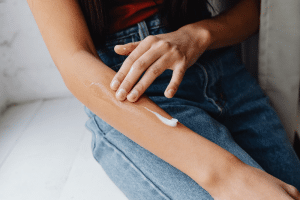Table of Contents
Without a doubt, caustic disinfectants, dry hospital air, an exhausting work environment, and long shifts substantially influence nurses’ skin daily. Maintaining a healthy and beautiful complexion in such vicious conditions can be difficult. Rest assured, under-eye circles, a dull complexion, or any other skin issues should not dampen your spirits. Embracing a revitalized and glowing appearance benefits your general health and allows you to create a lasting positive impact on people under your devoted care. Therefore, extra attention is required to guarantee healthy-looking skin. This article discusses 5 Skincare Tips For Nurses, products, and treatments designed to help nurses manage their rigorous schedules while fostering supple and radiant skin preservation.
1. Stress Management
Stress is notorious for significantly influencing our general well-being, including the condition of our skin. When stress piles up on you, your body starts producing stress hormones like cortisol that trigger several skin disorders, such as:
- Acne
- Premature Aging
- Eczema and Psoriasis
How Can You Prevent Stress?
- Deep Breathing Exercises: Deep breathing activates the relaxation response in the body, lowering tension and fostering calm. Deep breathing exercises should be done regularly, especially during breaks or when feeling overwhelmed and follow Skincare Tips For Nurses.
- Physical activity: Exercises are excellent stress reducers. Engage in enjoyable activities such as walking, running, dancing, or yoga. Endorphins, which are natural mood enhancers, are released during physical exercise.
- Time Management: Effective time management can help alleviate stress by giving you a sense of control over your schedule. Prioritize duties, delegate as much as possible, and make time for downtime and self-care. Consider online nursing education programs to prevent compromising work hours and professional development. With flexible schedules and e-learning platforms, you can pave the way toward honing your skills without stressing about personal or professional commitments.
- Hobbies: Engage in fun and calming hobbies such as reading, drawing, listening to music, or taking a relaxing bath. These hobbies can help you relax by diverting your attention from work-related stress.
2. Cleanse Your Skin
Healthcare settings expose nurses to infections, pollutants, and potentially hazardous chemicals. Cleansing your skin properly is critical for removing dirt, sweat, germs, and other contaminants that may accumulate throughout your shift.
Cleansing Tips
- Choose a mild cleanser that is appropriate for your skin type. Products labeled “non-comedogenic” or “gentle” will not clog your pores or create excessive dryness.
- Avoid using strong soaps or cleansers that can take away natural oils, causing skin dryness or irritation.
- Cleanse your face before your shift to remove any makeup, grime, or pollutants from the previous day. This creates a blank slate for your skincare regimen.
- Cleanse your skin again after your shift to remove any accumulated sweat, germs, and pollutants.
- Hot water should be avoided since it could strip away natural oils and produce dryness. Instead, wash your skin with lukewarm water. It aids in opening your pores, allowing for a more effective treatment.
- Use your fingers or a gentle washcloth. Scrubbing too forcefully can result in irritation. Instead, gently massage the cleanser into your skin in circular motions, focusing on areas prone to oil buildup or debris, such as the T-zone.
3. Seek Protection from The Sun
Nurses are frequently exposed to sunlight while working lengthy shifts indoors and outdoors. Here’s more on why sun protection is important and how you can protect your skin effectively:
Impact of Sun Damage
- Photoaging
- Sunburn
- Wrinkles and Fine lines
- Skin disorder, e.g., actinic keratosis, skin cancer, etc.
- irregular hyperpigmentation
Effective Sun Protection
- Use broad-spectrum sunscreen with a sun protection factor (SPF) of 30 or higher for all exposed parts of your skin.
- Select a sunscreen that protects against both UVA and UVB radiation.
- Reapply every two hours or more frequently if sweating or in contact with water.
- Wear skin-covering apparel like long-sleeved shirts, slacks, and wide-brimmed hats.
- Seek shade whenever possible, especially between 10 a.m. and 4 p.m. This can help lower your total sun exposure while providing respite from the sun rays.
- Wear sunglasses with UV protection to safeguard your eyes and the sensitive skin surrounding them. Look for sunglasses that completely block both UVA and UVB radiation.
4. Moisturize Extensively
Moisturizing your skin helps it retain its natural barrier function, which is critical for protecting it against environmental stresses, germs, and other hazardous chemicals, especially for nurses who are constantly exposed to allergens and must wash their hands. Moisturizers promote skin nourishment, avoiding excessive water loss and maintaining adequate hydration.

Moisturizing Tips
- Choose a moisturizer that is appropriate for your skin type and treats your particular concerns. Consider the ones including hydrating and nourishing components like hyaluronic acid, ceramides, glycerin, or natural oils.
- Pay special attention to dry regions, such as the cheeks and the brow.
- Remember to moisturize your lips to avoid dryness, chapping, and irritation; use a lip balm or moisturizer regularly. Look for nourishing products such as cocoa butter, beeswax, or coconut oil.
- Keep in mind that hydration includes both external and internal moisturization. Drink plenty of water throughout the day to promote overall skin health and hydration.
5. Exfoliate Gently
Exfoliation is a crucial step in skincare that includes eliminating dead skin cells from the skin’s surface. Exfoliation can help build a healthy, bright complexion and address common skin conditions. Let’s learn more about the advantages of incorporating exfoliation into your skincare routine.
Benefits of Exfoliation
- Removal of dead skin cells
- Improved skin texture
- Minimized pore congestion
- Enhanced Product Absorption
Types of Exfoliations
Physical exfoliation entails sloughing off dead skin cells with a scrub, brush, or tool. The top layer of skin is removed using moderate abrasion in this approach. Sugar or salt scrubs, microdermabrasion, and exfoliating brushes are a few examples.
Chemical exfoliation uses acids or enzymes to break the links between dead skin cells, allowing them to be removed more easily. Physical exfoliation is often milder than this method. Alpha hydroxy acids (AHAs), such as lactic or glycolic acid, beta hydroxy acids (BHAs), such as salicylic acid, and fruit enzymes, are common chemical exfoliants.
Exfoliation Tips
- Choose mild exfoliants or lower acid concentrations if you have reactive or delicate skin. You can use more potent products if your skin can take stronger exfoliation.
- The frequency of exfoliation is determined by your skin type and the exfoliant you’re using. Exfoliating 1-3 times a week is generally suggested. Start with once a week if you have sensitive skin and progressively increase if your skin tolerates it well.
- Run a patch test on a tiny portion of your skin before using a new exfoliant to check for any unpleasant reactions or allergies.
- Scrubbing too hard or using too much pressure can irritate the skin. Gently massage the product into moist skin in circular strokes. and follow Skincare Tips For Nurses.
Conclusion
As a diligent nurse, you must prioritize your skincare regimen to keep healthy and bright skin. You can reduce the impact of long hours and high-stress conditions on your skin by following these five Skincare Tips For Nurses. Remember that self-care is not selfish; it is essential to preserving your health and giving the best possible care to your patients. Invest in yourself, care for your skin, and enjoy the beauty of being a committed and dedicated nurse.


